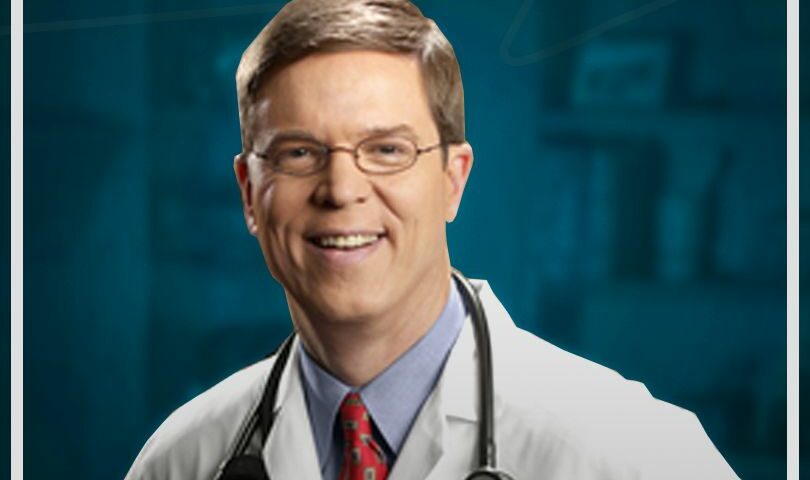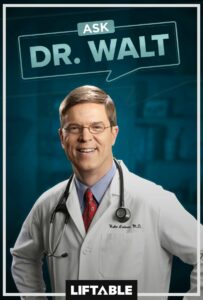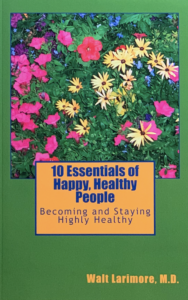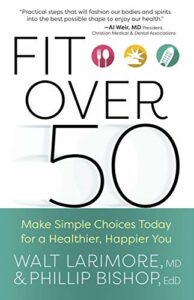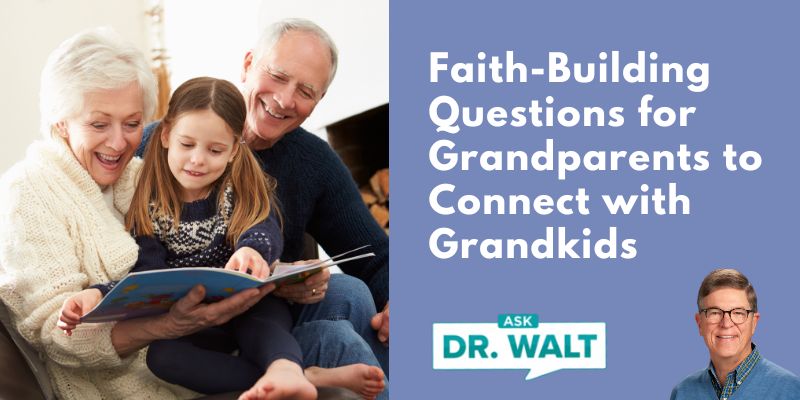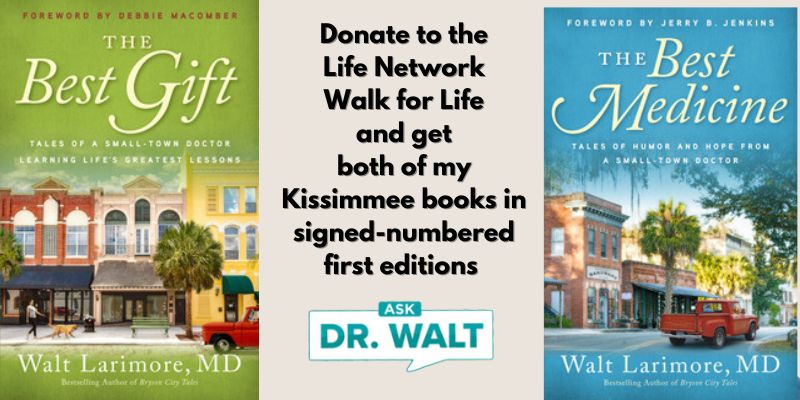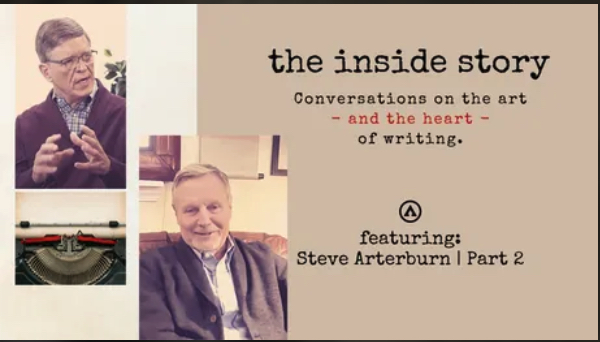
The Writer’s Studio 10 – My Interview with Steve Arterburn (Part 2)
June 16, 2023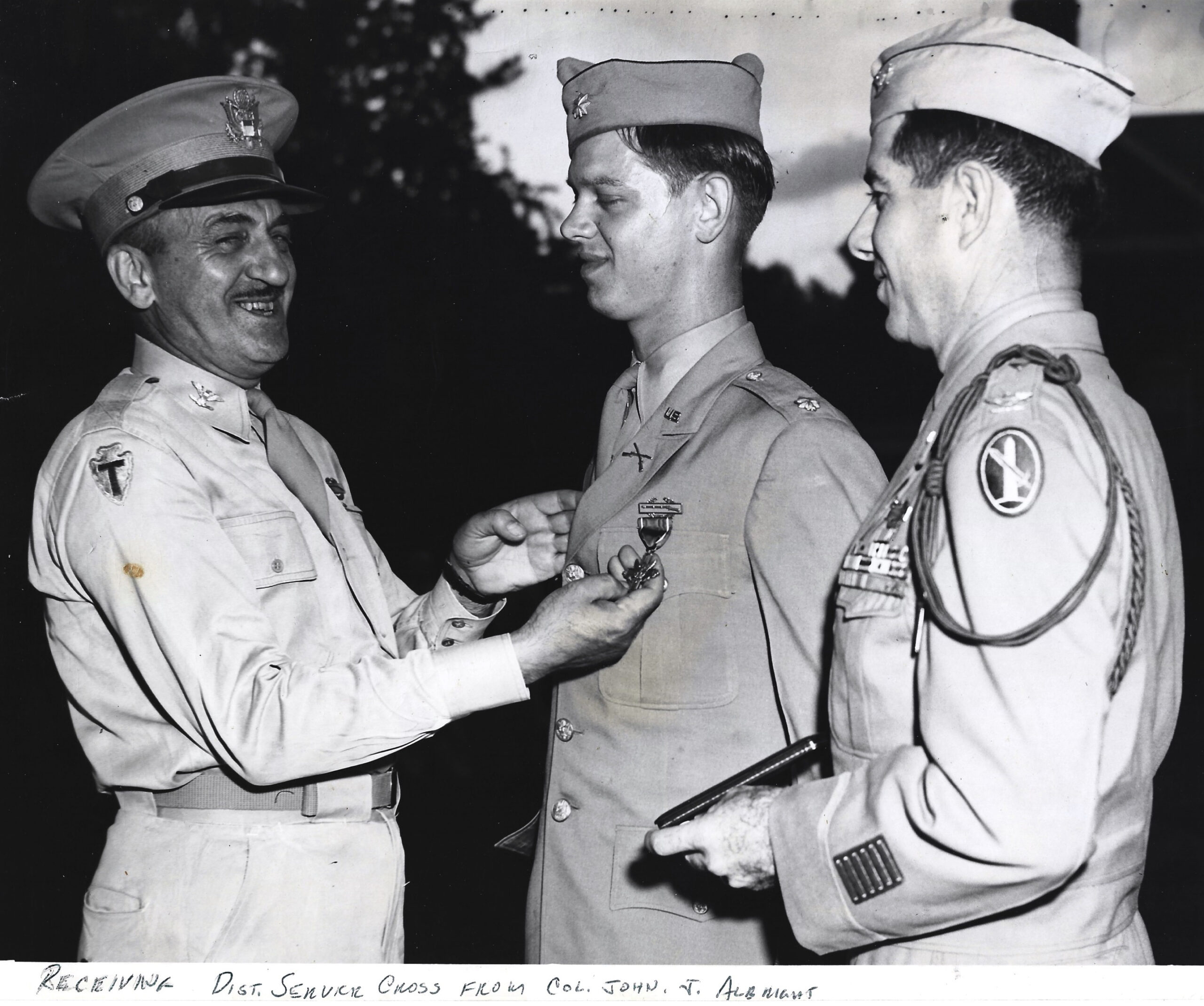
My Dad, Phil Larimore, to be inducted into the 3rd Infantry Division’s Marne Hall of Fame
June 21, 2023Ask Dr. Walt – Episode #08 – Essential #4 – Practicing Acceptance and Letting Go OR The Essential of Forgiveness (Part 1)
In this series, I’m explaining the 10 key habits or 10 essentials of happy, healthy people. In this episode, we’ll discuss “HEALTH AND FORGIVENESS” or “Essential #4 — Practicing Acceptance and Letting Go OR The Essential of Forgiveness – Part 1.” You can click below to watch a video of the show, or I’ve put the show transcript at the end of the blog if you’d prefer that.
From 2021-2022, I was honored to host a TV show on LiftableTV, “Ask Dr. Walt.” Today, I’m releasing Episode #8, Practicing Acceptance and Letting Go OR The Essential of Forgiveness – Part 1.
What is a medical doctor doing hosting a show on the topic of forgiveness? You may be thinking, “Aren’t there some more important topics you could discuss with us?” It turns out that if you are carrying a grudge or bitterness, it is actually poisoning you from the inside out. I’ll explain how and why on today’s episode of Ask Dr. Walt.
You can learn more about this topic in my best-selling book, 10 Essentials of Happy, Healthy People: Becoming and staying highly healthy or Fit over 50: Make Simple Choices for a Healthier, Happier You.
CLICK HERE FOR 10 E’S CLICK HERE FOR Fo50
Disclaimer: The Ask Dr. Walt show is designed for entertainment purposes to give information on various medical conditions, treatments, and procedures for your personal knowledge and to help you be a more informed consumer of medical and health services.
SHOW TRANSCRIPT
TEASE:
What is a medical doctor doing hosting a show on the topic of forgiveness? You may be thinking, “Aren’t there some more important topics you could discuss with us?” It turns out that if you are carrying a grudge or bitterness, it is actually poisoning you from the inside out. I’ll explain how and why on today’s episode of Ask Dr. Walt.
OPEN:
Hi, everyone. I’m family physician Dr. Walt Larimore and I’m delighted you are taking the time today to join me in my home office as we continue our discussion about some of the essentials of becoming healthy.
We’ve begun reviewing my top 10 recommendations for you to consider on a path to becoming healthier physically, emotionally/mentally, relationally, and spiritually. Last time, we covered reducing stress, anxiety, and depression, the essential of reducing SADnesses. At the end of that program, I asked you to email me at AskDrWalt@LiftableTV.com and let me know the next one you wanted me to cover. It turns out you voted for what was #4 on the list, the essential of forgiveness. At the end of the program, I’ll tell you how you can help me choose which of the next six topics we’ll discuss.
WE HAVE COVERED:
- The essential of true health—physical, emotional, relational, and spiritual
- The essential of self-care—how to be proactive in preventing disease
- The essential of reducing SADness—stress, anxiety, and depression
WE WILL COVER TODAY:
- The essential of forgiveness—how to practice acceptance and letting go
TO BE COVERED IN FUTURE PROGRAMS:
- The essential of relationships
- The essential of spiritual well-being
- The essential of a positive self-image
- The essential of discovering your destiny
- The essential of personal responsibility and empowerment
- The essential of teamwork in healthcare
Here are some of your questions about forgiveness that I’ll answer today:
- I’ve heard forgiveness can actually improve my physical health. Is that true? And, if so, how does that work?
- How do you expect me to forgive when I’ve been hurt so badly in the past?
- Is anger related to unforgiveness?
- My doctor told me that my ongoing anger issues are slowly killing me? What in the world is she talking about?
- Whether it’s healthy of not, I’ll never forgive my former husband for the way he abused me physically, sexually, and emotionally. Why would I ever let him off the hook for the way he hurt and scarred me. I hate him.
These are some difficult issues, wouldn’t you agree? And I’ll try to remember to answer each of them during our time together. But, I want to start this program by telling you a story about one of my favorite mentors during my time in medical school. Pediatrician, James Upp, M.D., was a deeply spiritual man and was superbly competent as a physician. I loved the rotations I spent in his office. I enjoyed both watching him work and observing how very much he enjoyed his work and his patients—a joy exceeded only by the joy he received from his relationship with his God and his family. He deeply loved them all.
One fateful evening, his youngest daughter, Diane, was driving down a dark road. A car approached her, and as it passed, one of the young men in the car tossed a concrete block at her car. The block crashed through the windshield of Diane’s car at over ninety miles an hour, instantly snuffing out her precious life.
The boys were apprehended and charged with homicide. While they were in jail, something happened that shocked them, their parents, and our town. Dr. Upp visited the parents of the boys to share in their sorrow and to offer them—face-to-face—his forgiveness. Then he stunned even his closest friends by going to the jail to visit the boys and to let them know that he had forgiven them. Why would Dr. Upp do such a thing? Would you?
Dr. Upp knew in his heart and then placed into action, his belief that hatred is most harmful to the person who hates. He knew he had to let go of his anger and resentment and blame. Then, and only then, could he heal. By forgiving the boys who had killed his daughter, Dr. Upp was not letting them off the hook. He knew that they would and should face punishment and suffer consequences for their actions. However, after the boys were convicted, he took the witness stand to ask the judge for mercy in the sentencing. He had spent time with these boys. He had seen them weep inconsolably for having taken from him one of his most precious blessings. He had seen their remorse and their sorrow. He trusted that his God would take this tragedy and create good.
Dr. Upp had learned that the one responsible for judging other human beings was not himself but his God. He was willing to trust that all vindication would be God’s, not his. Witnessing Dr. Upp’s attitudes and actions forever changed me. He demonstrated one of the keys of true health. Dr. Upp has passed away. I miss him. He loved his son and daughters. He loved life. He loved me. He lived and died a highly healthy person.
All of us have been wronged—have experienced unjust wounds. Unfortunately, some of us allow these hurts to grow into chronic anger, hostility, bitterness, grudges, cynicism, contempt, resentment, hatred, or victimhood we can’t, or won’t, leave behind. We are either unwilling or unable to get beyond our pain. We don’t understand that our unforgiveness is a slow, lethal toxin, poisoning us from the inside out. It’s not a small problem. Sixty-two percent of American adults say they need more forgiveness in their personal lives, according to a survey by the Fetzer Institute.
For anyone who has suffered as a result of another’s actions, I have this life-giving prescription: Make peace with your past. You must undertake the daunting task of learning to accept what you cannot change and let go of your pain and anger arising from the ways you have been hurt. In fact, your life may depend on it. When you choose not to forgive, you actually put yourself in a prison cell that slowly destroys your health because unforgiveness damages your body, your emotions or your relationship with yourself, your relational health with others, and, believe it or not, your relationship with God.
Here’s how I define forgiveness: The conscious decision to let go of resentment of vengeance toward someone or something you feel has harmed you in some way. Forgiveness is not (1) simply ignoring a wrong, (2) condoning or excusing a wrong, or (3) the same as reconciling. It takes two to reconcile, but only you to forgive. If you choose to be an unforgiving person, let me be very clear—you are endangering your physical, emotional, relational, and spiritual health. Let me show you how.
- First of all, unforgiving people damage their physical health in innumerable ways. One group of researchers reported that those who choose not to forgive and hold grudges have higher rates of heart disease and cardiac arrest, elevated blood pressure, stomach ulcers, arthritis, back problems, headaches, and chronic pain than those who didn’t. A Berkley study found that when people recalled a grudge or a past hurt, their blood pressure spiked.
In their best-selling book Anger Kills, authors Redford and Virginia Williams point to dozens of studies that show that anger is not just another negative emotion but something that can kill. Anger can lead to heart disease, heart attacks, heart rhythm irregularities, and many other life-threatening diseases. The Williams points out that a person who fails to recognize and deal with his or her anger is just like someone who each day takes a small dose of poison. Eventually, it makes your entire system toxic and can literally lead to your premature death.
Now, I’m not talking about people who get appropriately angry from time to time. In fact, the Bible tells us, “In your anger do not sin.” Occasional anger that is justified but temporary—for example, when you are treated unfairly—is not wrong or harmful. However, when anger is a constant companion—one you can’t leave behind—then your anger will prevent you from becoming a healthier person.
Unforgiveness and its toxic ABC siblings of anger, bitterness, and cynicism are among the negative moods that can be physically lethal. According to ScienceAlert, “Researchers found that people’s negative moods…were associated with higher levels of inflammation—the body’s natural immune response to injury and infection, but which is also a common hallmark of ill health and chronic disease.”
- Second, unforgiving people damage their emotional health by becoming prideful, resentful, bitter, lonely, fearful, joyless, exhausted, irrational, self-destructive, indifferent to helpful advice, self-righteous, hopeless, and finally emotionally dead. Johns Hopkins experts tell us that people who hold grudges are more likely to experience severe depression and post-traumatic stress disorder.
- Third, unforgiving people damage their relational health by becoming angry, vengeful, hostile, judgmental, defensive, blaming, violent, manipulative, non-communicative, untrusting, self-absorbed, negative, cynical, and stubborn. They literally poison and then kill their relationships with others.
- Finally, unforgiving people compromise their spiritual health by poisoning their relationship with God. Jesus could not have been clearer than he was in Matthew 6:14-15: “For if you forgive other people when they sin against you, your heavenly Father will also forgive you. But if you do not forgive others their sins, your Father will not forgive your sins.”
“There is an enormous physical burden to being hurt and disappointed,” says Karen Swartz, MD, from Johns Hopkins Hospital. “Chronic anger puts you into a fight-or-flight mode, which results in numerous changes in heart rate, blood pressure, and immune response. Those changes, then, increase the risk of depression, heart disease, and diabetes, among other conditions. Forgiveness, however, calms stress levels, leading to improved health.”
The good news is research that shows the simple act of forgiveness “can reap huge rewards for your health, lowering the risk of heart attack; improving cholesterol levels and sleep; and reducing pain, blood pressure, and levels of anxiety, depression and stress. And research points to an increase in the forgiveness-health connection as you age.”
Harboring anger, hurt, or resentment always gnaws away at a person’s happiness and health. A 2014 review article concluded, “It can sometimes seem like forgiveness is a concept from biblical times. But a wealth of research suggests we should apply the act to our daily lives because it may hold a myriad of health benefits.”
You may say, “But, Dr. Walt, I don’t feel like forgiving.” Well, think of it this way: Suppose you have a little baby whose diaper is dirty. You don’t say, “Well, Dr. Walt, I don’t feel like changing the diaper.” No, you make the decision to do so because it’s in your and your baby’s benefit. You know, for a fact, that if you don’t change that diaper, things are going to get really messy. It’s precisely the same with unforgiveness.
Another researcher concluded, “Failing to forgive, or unforgiveness, is the practice of engaging in ruminative thoughts of anger, vengeance, hate, and resentment that have unproductive outcomes for the ruminator, such as increased anxiety, depression, elevated blood pressure, vascular resistance, decreased immune response, and worse outcomes in coronary artery disease.”
Mayo Clinic tells us that forgiveness “brings with it plenty of health benefits, including improved relationships, decreased anxiety and stress, lower blood pressure, a lowered risk of depression, and stronger immune and heart health. Letting go of negative emotions can often have a remarkable impact on the body.”
The truth is that anger, bitterness, cynicism, and grudges—all the manifestations of unforgiveness—can kill. I remember seeing anger’s effect on a patient named Anne.
She was a walking time bomb. The problems recorded on her medical chart were chilling: morbid obesity, depression (probably bipolar), hypertension, high cholesterol, peripheral artery disease, asthma and allergies, sleep disorder, chronic dermatitis, and chronic fatigue. On any checklist of risk factors for early death, Anne ranked near the top. Her only enjoyment in and escape from life was her teaching job. Her only exercise was moving to and from the car. Her diet was a nutritional den of iniquity.
Anne was frequently in my office and had been in the hospital a number of times. She knew every doctor and nurse there. Anne needed to change her life and her lifestyle, but for some reason, she couldn’t.
“Dr. Walt,” she sighed when I once again suggested she see a Christian psychologist who had just joined our practice, “I’ve been to counselor after counselor. They’re no help at all. Whenever I take one step forward, I just seem to lose control and fall two or three steps back.”
“Anne,” I said rather sternly, “if you want to become healthy and if you want me to continue to serve you, then you and I need to schedule some time with Gil Hanson, our new psychologist. If he can’t help you, well, at least maybe he can help me!”
She looked surprised. Then she laughed. “OK, OK. I’ll go. But just once.” I agreed—not sure what we might be getting into.
Anne’s session with the psychologist began innocently enough. Both Anne and I gave brief summaries of the problems she was having and the problems we had in working together. He began to focus on Anne’s past. In what seemed like only a few minutes, she told him about watching her father die on the kitchen floor—in front of her five-year-old eyes. She watched her mother become an alcoholic and then marry a man who abused Anne and her sister for a number of years. She watched her mother get beaten whenever she tried to intervene or protect her daughters. When they arrived home from high school one day, Anne and her sister found their mom hanging from an electric cord in the garage—death by suicide.
I was stunned as we watched Anne dissolve into waves of uncontrollable sobbing. “I didn’t know,” I muttered to my colleague, “She never told me any of this.”
“Walt,” he told me, “she couldn’t tell anyone until she was ready.”
Several years later, after a great deal of work, an increasingly healthier Anne told me, “The anger from my past was eating me alive. If we hadn’t dealt with it the way we did, it would’ve killed me!”
I believe she was right. How did she deal with it? She learned the essential of forgiveness and applied it to her life—forgiving her father, her mother, her stepfather, and herself. The result? I saw her health improve dramatically.
Researchers in San Diego, California, published a survey of more than 20,000 adults, which showed that those who suffered physical, psychological, or emotional abuse as children, or were raised in homes where they experienced or observed physical violence, substance abuse, mental illness, or criminal behavior, were far more likely, as adults, to develop serious illnesses—such as heart disease, asthma, bronchitis, diabetes, and cancer.
These researchers concluded that hostile experiences in childhood underlie the most
common causes of death in America. The cause points to the anger, anxiety, and depression produced in the young victims of these terrible experiences. When these kids are growing up, they often self-medicate their pain with behaviors such as overeating, smoking, and using drugs or alcohol—which they often find to be effective coping devices tending to lead to chronic use. Clearly, then, these early traumatic experiences can be a huge roadblock to becoming a truly healthy person.
Many other researchers have concluded that there are a multitude of ways that the unresolved trauma, shock, or ordeals of one’s childhood can stand in the way of high degrees of health. There are dozens of studies demonstrating that chronic stress caused by unresolved emotional pain causes damage to the immune system and the circulatory system. What’s more, it can also depress vital cardiac function, hormone levels, and other physical functions.
For anyone who has suffered as a result of another’s actions—and that includes every last one of us—Again, I have this life-giving prescription: We must make peace with our past. We must undertake the daunting task of learning to accept what we cannot change and let go of our pain and anger over the ways we have been hurt. Our physical, emotional, relational, and spiritual health—our very mortal and eternal lives—may literally depend on it.
One final thought: I find some of my patients who, when reliving the pain of past injustice or wrong, find themselves wrestling with a great deal of shame—particularly those who are victims of sexual exploitation and abuse. I’ve told my patients that I consider shame to be a cancer of the spirit. Shame has so many negative effects. If you are living with shame, then it will be virtually impossible for you to become a highly healthy person. Shame makes you feel worthless, undeserving, and unlovable.
We all need to understand that shame and guilt are different from conviction or remorse. Feeling convicted or remorseful is feeling bad about things you have done or failed to do in the past. Shame or guilt is feeling bad about who you are. The theologians tell us that shame or guilt comes from the enemy of our souls, while conviction comes from a loving Creator.
The surest way to overcome this form of shame or guilt is to begin to understand who you are from God’s point of view. Without banishing shame from your soul, the process of forgiveness often will not continue. If you are not able to do this, I encourage you to seek professional pastoral counseling.
Do you see now why forgiveness is one of my ten essentials of truly healthy people?
The American Psychological Association says, “Forgiveness improves mental and physical health.” Dr. J. Nick Pitts writes, “When we fail to free others from the pain, they caused us, we continue to hold ourselves captive to the pain that hurts us.”
Louis B. Smedes wisely points out, “To forgive is to set a prisoner free and discover the prisoner was you.” He adds, “When you choose to forgive and move forward, you’re not saying those betrayals didn’t hurt; you’re just choosing to live in freedom instead of a prison cell of anger.”
Friends, it’s as if the experts are all saying, “Forgive to live!”
If you’re one of the many folks who believe the old adage, “To err is human, to forgive divine,” take note that medical science has established beyond a shadow of a doubt that “To err is human, but to forgive gives healing to yourself.”
Is this making sense? Is it helpful? It is for many of my patients. But because we’re running out of time, I’m going to cut it off here. Next time, we’ll look at part two about forgiveness and what it does to make highly healthy people.
If you want to drop me an email at AskDrWalt@LiftableTV.com, please do. Let me any questions you have. What concerns do you have about your or your family’s health? One warning, I cannot answer specific questions about your individual health, but I bet you have plenty of great general questions to ask me, so send them to AskDrWalt@LiftableTV.com, and we’ll get to as many as we can during future programs.
In addition, you can read more about these 10 Essentials in two books that you can find on my website, www.DrWalt.com. One is Fit over 50: Make Simple Choices for a Healthier, Happier You, and the other is 10 Essentials of Happy, Healthy People: Becoming and staying highly healthy.
Don’t forget to vote on our next program. Until our next visit, let’s get moving together toward true health, and “Dear friend, I pray that you may enjoy good health and that all may go well with you, even as your soul is getting along well.”
Disclaimer: The “Ask Dr. Walt” show is designed for entertainment purposes to give information on various medical conditions, treatments, and procedures for your personal knowledge and to help you be a more informed consumer of medical and health services.
© Copyright WLL, INC. 2023. This blog provides healthcare tips and advice that you can trust about a wide variety of general health information only and is not intended to be a substitute for professional medical advice, diagnosis, or treatment from your regular physician. If you are concerned about your health, take what you learn from this blog and meet with your personal doctor to discuss your concerns.

